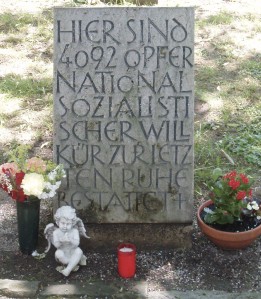> If you don’t know the brief, sad yet courageous story of the Scholl siblings, Sophie and Hans, then go directly to the Sophie Scholl entry in wikipedia before you continue. In all honesty, it’s not clear to me why she gets most of the attention, and her brother less, but perhaps society doesn’t expect a 21 year old woman to be brave, and give up her life for her friends. This one did.
If you don’t know the brief, sad yet courageous story of the Scholl siblings, Sophie and Hans, then go directly to the Sophie Scholl entry in wikipedia before you continue. In all honesty, it’s not clear to me why she gets most of the attention, and her brother less, but perhaps society doesn’t expect a 21 year old woman to be brave, and give up her life for her friends. This one did.
Right beyond those trees in the background, unseen, is the Stadelheim Prison where the Scholls and Christoph Probst were executed by guillotine. As unfeeling as it may sound, they were lucky. The July 20th conspirators, (the non-military individuals, who didn’t get the honor of a bullet to the head), suffered gruesome, drawn-out, painful deaths by hanging with piano wire, after having been given heart boosting meds to keep them going as long as possible. And, of course, being gassed was much worse as well.
 “Here lie in their last resting place 4092 victims of National Socialist caprice.” No names, no reasons for their deaths. I think they, too, may have come here through the back door of the prison.
“Here lie in their last resting place 4092 victims of National Socialist caprice.” No names, no reasons for their deaths. I think they, too, may have come here through the back door of the prison.
 What looks like papers lying on the sidewalk is actually part of a monument to the Scholls and to The White Rose resistance group, one of their methods having been to leave anti-nazi leaflets lying around where there were crowds of students.
What looks like papers lying on the sidewalk is actually part of a monument to the Scholls and to The White Rose resistance group, one of their methods having been to leave anti-nazi leaflets lying around where there were crowds of students.
 The work here combines images and biographical information about the members, as well as examples of their writing. It’s at the front of the Ludwig Maximilian University, Leopoldstrasse, Munich.
The work here combines images and biographical information about the members, as well as examples of their writing. It’s at the front of the Ludwig Maximilian University, Leopoldstrasse, Munich.
 Walking back into the city center I literally walked over this before I realized that it too was a memorial embedded into the sidewalk. The figure is meant to remind one of a police body outline. The words above it read, in German, “Kurt Eisner, who on 8 November 1918 proclaimed the Bavarian Republic, later Prime Minister of the State of Bavaria, was murdered on this spot on 21 February 1919.” Eisner has been all but forgotten amid all the turmoil of the 20th century in Germany, but he was instrumental in pulling Bavaria out from under the monarchy by getting Ludwig III to sort of just leave without even officially abdicating. Depending on who you believe, Eisner’s murderer was either acting as a monarchist (being from an aristocratic family) or an anti-semite, himself Jewish but wishing to prove his nationalist loyalties. (He had been shut out of a pre-nazi group because of his mother’s ancestry.)
Walking back into the city center I literally walked over this before I realized that it too was a memorial embedded into the sidewalk. The figure is meant to remind one of a police body outline. The words above it read, in German, “Kurt Eisner, who on 8 November 1918 proclaimed the Bavarian Republic, later Prime Minister of the State of Bavaria, was murdered on this spot on 21 February 1919.” Eisner has been all but forgotten amid all the turmoil of the 20th century in Germany, but he was instrumental in pulling Bavaria out from under the monarchy by getting Ludwig III to sort of just leave without even officially abdicating. Depending on who you believe, Eisner’s murderer was either acting as a monarchist (being from an aristocratic family) or an anti-semite, himself Jewish but wishing to prove his nationalist loyalties. (He had been shut out of a pre-nazi group because of his mother’s ancestry.)
There is so much history just staring right at you, all over the city.

>"Caprice" is an interesting choice of word. -Carlisle
LikeLike
>The word "Willkür" also means arbitrariness, so in the sense of not having any reason. Senseless killing, I guess we would say. I thought it was an interesting choice of word as well.
LikeLike